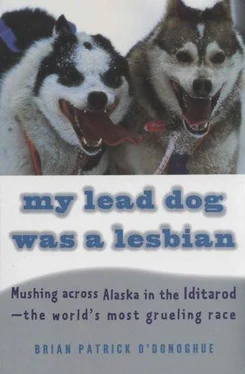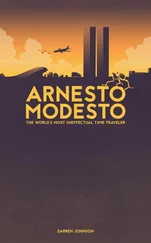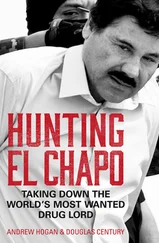I’d only used Harley in lead once before — on a dark night marked by mutiny and desperation. On that occasion, Harley and Denali, the only dogs still showing any confidence in my miserable sense of direction, led the final miles back to our cabin. Denali was a hindrance. The big young male had no idea what to do. But Harley barreled straight through, dragging his baffled partner along. Listening to me recount the performance, Mowry refused to give Harley any credit. He figured the big dog was probably just hungry and making a beeline for his food dish.
Today Harley’s inexperience showed as we entered an icy marsh, where the trail was less obvious. He repeatedly slowed to look back, seeing encouragement. “Go ahead, Harley!” A few firm words aimed at him had a powerful effect on the entire team. As the big leader’s attention returned to his work, I felt an immediate burst of speed, as if I’d tugged on a snowmachine’s gas throttle.
It was dark as we approached Skwentna, a remote settlement of about a hundred homesteaders, trappers, and lodge operators. I was startled by the sudden appearance of what seemed like dozens of fiery red eyes floating toward me, cloudlike, in the beam of my headlamp. Drawing closer, I sheepishly realized it was merely a musher coming the other way. The unearthly orbs belonged to the front dogs in John Barron’s team. The taciturn, grizzly musher from Big Lake had already turned for home. Holding the lead on these familiar trails, he ran with his headlamp switched off to confuse the mushers in pursuit. I’d reported on tactics like that but hadn’t yet seen them used.
Several other teams followed hot behind Barron. I gripped the handlebar tightly, braced for calamity, but Rainy and Harley handled the head-on passes without a hitch. Third among the approaching teams came Marcie Heckler, the friend who’d talked me into using the Klondike as my own 200-mile qualifier. Marcie wasn’t an experienced racer, but she may as well have been. For years she’d worked as a handler for Old Joe — Iditarod’s founder, Joe Redington, Sr. — and her boyfriend, Kevin, was enforcing the rules in the Klondike.
“Almost there, Bri,” Marcie grunted as she flashed past.
Leaving the river behind, I followed a line of markers to a circular driveway fronting an old cabin. The Skwentna checker inspected my gear, then handed me the clipboard to sign in.
“Looking pretty good, Brian.”
“Beginner’s luck,” I said, though I didn’t really believe that.
Bedding my team in a stand of tall birch, I began preparing the dogs a well-deserved bite to eat. Without even trying, my team had leaped ahead of ten others. Not too shabby. I wasn’t going to win this race. But some of those teams ahead of mine were bound to falter.
I studied the dogs. Raven sprawled luxuriously, her tummy thrust outward inviting a quick scratch. Who’d have guessed that the frail, fine-boned little girl possessed the stamina to run all the way to the Bering Sea coast, as she had done for Mowry his first time out? But the princess was a proven Iditarod dog.
We didn’t know as much about the racing history of Raven’s companions, however. Few seemed tired tonight. Most were still keyed up, licking their paws. Harley and Pig were watching my every move, drooling in anticipation of the feast on its way.
Harley’s appetite was the only quality Mowry found impressive.
“He’s too big,” the Coach had said the day I brought him home. “His build is all wrong. A dog like that will never make it to the finish line.”
I put more faith in the assessment of LeRoy Shank. He’d seen Harley racing for Andy Jimmy, an Athabaskan villager from Minto. Jimmy had done well that day, very well. Shank, a former trapper and founder of the 1,000-mile Yukon Quest, knew that sled dogs weren’t kept through the winter in Minto unless they were well worth feeding. After the race, he had bought the beefy village husky on the spot.
Shank worked as a pressman at our newspaper. The two-time Iditarod veteran had no plans to race this year, so he took vicarious pleasure in my preparations, stopping me in the hall ways for progress reports, badgering me to give the Minto dog a tryout. “Oh, he’s a big one,” Shank said, after offering to loan me the dog for the season. “Harley could drag you to Nome all by himself.”
Handling Harley was a chore. He had playfully knocked me on my ass more than once. Wrist injuries were a definite risk for anyone holding this twisting, excitable husky by his collar. He attacked food like a starving convict, slurping his bowl clean as fast as I filled it. He’d whimper pitifully as he watched me feed his kennel mates. I was a sucker for it. I always gave him seconds, often thirds, and sometimes even fourths. But Harley was never satisfied. Given the chance, he’d eat until he burst.
I poured a bucket of hot water into the sixteen-gallon cooler to soak the mash of dry dog food and frozen beef chunks. We’d come 100 miles in about 14 hours, yet none of my dogs looked tired. All 12 had their eyes fixed on the steam rising from that cooler. If I could hold the team together, we just might do very well indeed.
Gunnar Johnson hoped to squeeze in a trip to Nome before surrendering his life to medical school. He mushed into Skwentna in a horrified state. A dead dog was stowed in his sled basket. The dog had collapsed with absolutely no warning. No warning at all. Gunnar tenderly laid the dog’s body in the snow alongside the camp. Moving in a daze, he fixed the other dogs a meal. He was chopping meat when a movement caught his attention. Glancing up, Gunnar saw the dead dog panting for a snack.
Tom Daily also arrived at the halfway point carrying a dog. He’d spent $1,500 flying Zowie, his favorite leader, from his remote training camp to a clinic a few months before, after the dog ate a bum salmon. Zowie had pulled through, but still hadn’t regained his stamina. That much was obvious. Daily hated to admit it, but his entire team’s performance left a lot to be desired. Short training runs weren’t adequate to prepare dogs for a trip of this distance. The former hippie knew that from making his living giving sled-dog rides in Colorado. A once-in-a-lifetime sponsorship offer had landed him here, but the disruption of relocating North had interfered with training. With or without Zowie, these dogs were hurting.
Lynda Plettner wasn’t an official Klondike participant. Why pay an entry fee when she wasn’t here to race? Plettner was just tagging along. Someone had to keep an eye on Urtha Lenthar, the schoolteacher leasing dogs from Plettner’s kennel.
By Skwentna, Plettner had abandoned any attempt at maintaining a casual distance. Barking orders in a voice improbably loud, the Iditarod veteran was directing Lenthar’s every move. Her dogs were ready, Plettner decided, but the big goof riding the sled needed a lot of work.
Barry Lee’s borrowed dogs were short on conditioning. With that in mind, Lee took it easy the first 100 miles of the Klondike. Driving two hours, then resting two or three.
“This race will more than double some of their mileage,” Barry told me, watching his dogs settling down as I prepared to break camp.
I knew Lee from covering past races. He was one of those guys who was always turning up as a checkpoint volunteer. His confession about his dogs’ training distances was startling. All of my dogs had at least double, if not triple, that many miles of conditioning, and here Barry was playing catch-up. The dogs weren’t the only ones in need of conditioning. The musher’s gut was as wide as his habitual smile. Stepping inside the roadhouse, Barry staggered under the weight of the past 100 miles.
In the warmth of the kitchen, Lee munched on a wonderful cheeseburger, washing it down with pitcher after pitcher of iced tea. Then he went into the common room and stretched out on the floor for a quick nap. The musher awoke six hours later, racked by pain. His jaw was cramped. His arms were cramped. His abdomen and upper and lower legs were cramped. Struggling to a table, Lee grabbed a full pitcher of water and drained it. All that tea had dehydrated his system, causing his muscles to cramp during his long unplanned snooze. Barry suddenly had to pee so badly he wasn’t sure he could make it to a bathroom. Fortunately, his bladder was also cramped.
Читать дальше












